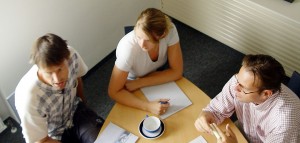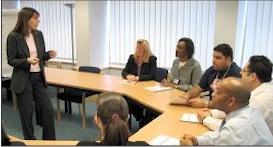What to do When Group Dynamics or Group Conflict are a Problem

Once you are promoted to a group leadership role you will find yourself responsible for meeting or group facilitation as a regular part of your role. So it is important you develop the skills required to manage group dynamics and handle any group conflict effectively.
Aside from routine team meetings, there are many other groups you may be called upon to facilitate. Strategic planning workshops, incident debriefs, departmental meetings, external events or conferences and more. So it makes sense to ensure you know enough about group facilitation to decide whether you should do it yourself or bring in external professional facilitators in a given situation.
Although group facilitating might sometimes look easy, for many people the workshop facilitation skills required to achieve a satisfactory outcome can be more of a challenge than anticipated.
As a workshop facilitator, you need to be particularly conscious of group dynamics, including any pre-existing or emerging group conflict, and manage the process and personalities, all while you remain focused on the specific outcomes and results you are trying to achieve. This can be very difficult to do, if you also want to contribute to the discussion.
A good professional facilitator will be acutely aware of the group dynamics, including any potential group conflict, when facilitating a workshop, debriefing session, strategic planning process or meeting.
Here are three critical aspects of group dynamics a meeting facilitator must manage:
Group Conflict
Work group conflict is one aspect of meetings that worries many people, but when it is managed properly by an experienced group facilitator, it can be quite positive.
In fact, groups that suppress differences of style, opinion or approach or never discuss any underlying group conflict, are rarely as successful over the long term as those that accept and even encourage discussion about areas of dissent or group conflict.
When you are exploring long term options in a strategic planning process, different perspectives and disagreements are a healthy part of work communication and should be both encouraged and respected.
If you are bringing in an external facilitator for your meeting or workshop and you expect conflict within the group, you should discuss your concerns with any potential group facilitators in advance. This way you can be confident the professional facilitators you select will incorporate group exercises that ensure all participants have the opportunity to express themselves appropriately.
When conflict persists a skilled meeting facilitator will still be able to build understanding and a level of consensus about the next actions to be taken, despite any group conflict.
Dominant Personalities
Another important aspect of group dynamics to consider is whether there are any dominant personalities in the group who may make it difficult for others to contribute fully to the workshop.
The professional facilitators role in this situation is to ensure everyone participates in all group exercises and discussions, not just dominant, extroverted or senior members of the group.
In some situations it may be necessary to address cultural expectations of who should speak or when someone should speak. Some individuals or cultural groups expect to be asked for their input before they will contribute to discussions and a good facilitator will ensure everyone is explicitly invited to contribute to each key discussion or group exercises during the meeting or workshop.
Assumptions
The final aspect of group dynamics I want to address is that of assumptions. When people work together, or spend a lot of time together, it becomes easy to assume that everyone shares the same point of view or perspective on a whole range of matters, including how people will interact with each other as well as the topic under discussion.
A skilled meeting facilitator will be focused on detecting and questioning assumptions. Common assumptions that may need to be made explicit and addressed revolve around the program agenda and expected outcomes, and about exactly how the workshop will be run.
To facilitate a positive group dynamic and productive group exercises, group agreement should be sought about how things that might otherwise be assumed will be handled. Agreement should be sought about things such as interruptions and phone calls, breaks and punctuality, confidentiality and respect, listening to other participants and even speaking one at a time, for example.
If you decide that the group facilitating role is one you can (or need to) handle yourself, focusing on these three key areas of group dynamics – including group conflict, personalities and assumptions – will help you to gain most from your group leadership role.
Kerrie Mullins-Gunst (MBA, BSc, DipEd, FAICD, FRACI) is an experienced and professional business facilitator. Call our office on 03-9859 3924 today to discuss your group facilitation needs.
Should you decide that you will be more likely to overcome any group conflict issues and achieve your desired outcomes by using an external group facilitator, please call us on 03-9859 3924 to discuss how we can help you with professional meeting facilitation.

 The problem is that, in this busy world, everyone around the table has a lot of things they personally need to do – and those things aren’t necessarily what you called the meeting for!
The problem is that, in this busy world, everyone around the table has a lot of things they personally need to do – and those things aren’t necessarily what you called the meeting for!





Effective Strategic Planning
The process of strategic planning is probably one of the most powerful tools available to an organisation, department or team. When a group work together to develop a plan they carry a strong commitment to implementing it away with them.
Yet too many people have had poor experiences with strategic planning sessions which fail to reach decisions, or where communication problems, dominant personalities and internal politics prevent constructive interaction.
There is a lot written about strategic planning, but much less on how to ensure your strategic planning session is effective.
What makes Strategic Planning Effective?
A successful and effective strategic planning session needs to:
Achieving all these outcomes, as well as generating a sound strategic plan, is more likely with independent, professional facilitation. A good strategic planning facilitator brings structure, an impartial perspective and useful expertise, experience and feedback.
Experience shows that when your strategic planning session is run by a team member the most likely outcome is a long staff meeting, with all the inherent dangers of entrenched positions, ‘group think’ and resistance to change.
An experienced facilitator who is expert in the strategic planning process can guide your group to a successful outcome by introducing new approaches and helping participants think creatively about problems, issues and opportunities.
By keeping discussions focused, on track and on time, and ensuring all voices are heard, key decisions are taken in a positive way, making sure your strategic planning is most effective.
Special Offer
If you are uncertain whether to use an external facilitator for your meeting, or you need to convince someone else to use one, have a look at our Free Fact Sheet ‘Why Use a Facilitator?’
(More ideas on how you can facilitate effective strategic planning in the Quick Tips below.)
Strategic Planning Facilitation Quick Tips
Involve your facilitator in designing your planning session. Their experience with many other groups offers valuable insight and new perspectives into what will be most effective in achieving your goals for the planning process.
A competent and experienced facilitator will have the flexibility, skills and ability to guide your group to its ultimate objective via a range of different paths. Encourage and empower your facilitator to modify planned activities in response to the group dynamic on the day.
Consider using an external strategic planning facilitator for other important meetings such as project debriefs, incident reviews, evaluations sessions, change implementation programs, employee forums, community or customer consultations and leadership programs.
…And Call us on 03-9859 3924 to discuss how we can help make your next strategic planning workshop your most effective yet!
Categories: Strategic planning - Tags: business strategic planning, business strategy consulting, effective marketing strategy planning sessions, effective meetings, effective plannin session, effective planning, effective planning days, effective planning in marketing, effective planning sessions, effective planning strategies, effective strategic meetings, effective strategic planning, effective strategic planning manual, effective strategic planning meetings, effective strategic planning session, Effective Strategic Planning Sessions, efficient strategic planning, facilitate a planning day, facilitate a strategic planning meeting, facilitate a strategic planning session, facilitate an effective strategic planning meeting, facilitate strategic planning meeting, facilitate strategic planning session, facilitates strategic planning sessions, Facilitating a Business Planning Session, facilitating a meeting to establish strategic direction, facilitating a one-day strategic planning session, facilitating a planning session, facilitating a startegic planning meeting, facilitating a strategic plan session, facilitating a strategic planning meeting, facilitating a strategic planning meetings, facilitating a strategic planning session, facilitating a strategy planning session, facilitating an it strategic planning session, facilitating effective strategic planning, facilitating planning, facilitating planning day, facilitating planning days, facilitating planning guide, facilitating planning session, facilitating planning sessions, facilitating strategic direction discussion, facilitating strategic planning meeting, facilitating strategic planning meetings, facilitating strategic planning session, facilitating strategic planning sessions, facilitating team planning, facilitating the planning meeting, facilitating visual strategic planning sessions, facilitation of strategic planning session, facilitation of strategic planning sessions, facilitation planning day, facilitation services, facilitator rates for strategic planning session, facilitator strategic planning session military, faciltating a strategic planning meeting, faciltating strategic planning, faciltating the strategic plan, format to facilitate a strategic planning session, group facilitation, group facilitator, guide Facilitation of a Strategic Meeting, guide to facilitating strategic planning, how can stragic planning be efficient, how long is an effective strategy meeting, How to conduct a strategic planning session, how to design an effective strategic planning session, how to do facilitate a strategic planning session, how to facilate a strategic plan session, how to faciliate a strategic planning session, how to facilitata a planning day, how to facilitate a business planning session, how to facilitate a church strategic planning meeting, how to facilitate a planning day, how to facilitate a strategic planning meeting, how to facilitate a strategic planning session, how to facilitate a strategy planning meeting, how to facilitate effective teambuilders, how to facilitate strategic meetings, how to facilitate strategic planing session, how to facilitate strategic planning, how to facilitate strategic planning session, how to manage an effective planning day, how to plan an effective visioning session, how to plan for a effective strategic planning session, how to run a stategic planning session, how to run a strategic planning session, how to run a stratgic planning session, how to run an effective strategic planning meeting, http://kmgconsulting com au/strategic-planning/effective-strategic-planning/, ideas for facilitating business planning sessions, ideas on how to facilitate strategic planning, leadership planning session, leadership planning sessions, meeting facilitation skills, planning a effective session, planning an effective strategy session, planning day facilitation, Planning Session Ideas, politics, professional facilitator, Resources for facilitating planning sessions, Running a Strategic planning session for Directors, running a strategic planning workshop, running a strategy session, running a team strategy session, selling a business strategic planning session, strategi marketing kmg, strategic business planning, strategic plan, Strategic Plan tips add comment, strategic planning, strategic planning day, strategic planning effectiveness, strategic planning facilitation, strategic planning meeting, strategic planning resources, STRATEGIC PLANNING SESSION, strategic planning session ideas, strategic planning sessions, Strategic planning team days what to cover, strategy and planning consulting, strategy planning session, structure to facilitate day planning meeting, successful strategic planning meetings, successful strategic planning session, team plaaning session, team planning session, techniques that makes strategic planning effective, template for and effective planning session, The Need for Effective Strategic Planning, tips for a successful strategic planning session?, tips for an effective strategic planning, tips for effective strategic planning, tips for facilitating meetings strategic planning, tips for facilitating planning meeting, tips for facilitating strategic planning, tips for strategic planning meetings, tips for strategic planning session, tips on facilitating scenario planning sessions, tips with strategic planning sessions, trends in strategic planning, what is effective strategic, what is effective strategic plnnning, What is effective Strategy planning, What makes consultancy planning effective?, What makes for an effective strategic plan, what makes up a successful strategic planning session, workshop facilitation tips